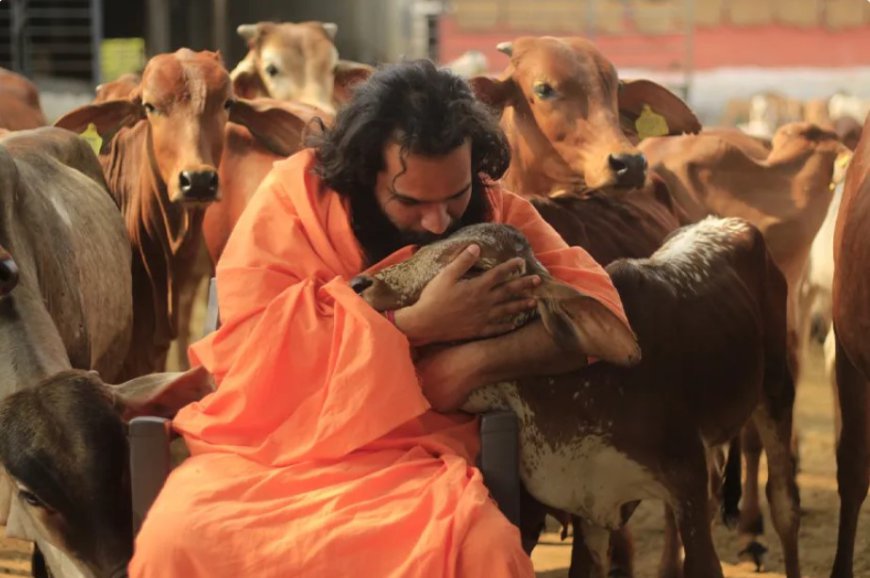Save the Mother Cow : It Saves Our Culture and Future

The sacred role of the cow in Indian culture transcends mere reverence; it represents a crucial link to the preservation of ancient traditions, sustainable agriculture, and the nurturing of life itself. The slogan "Save the Mother Cow - It Saves Our Culture and Future" embodies a deep-rooted philosophy that advocates for the protection and care of cows, which are not only a source of livelihood but also a symbol of spiritual and cultural significance in Hinduism.
Shree Krishnayan Desi Gauraksha Evam Gaulok Dham Sewa Samiti’ is one of the largest Gaurakshashala of Desi cows in India. We protect, feed & shelter ailing, starving, destitute and stray Desi Cows & Bulls, the majority of which are abandoned by their owners or saved from butchers.
Vedic Tradition and the Role of Cows:
In the Vedas, cows are referred to as "Kamadhenu," the divine mother who grants all wishes. This exalted status is echoed throughout ancient texts like the Rigveda and Puranas, which emphasize the holistic benefits of cow-based products, such as milk, ghee, curd, dung, and urine. These products are not only nutritious but are believed to possess healing properties, making them invaluable in Ayurvedic medicine. For centuries, Indian society has embraced the cow as a spiritual and practical cornerstone of life, attributing prosperity, health, and peace to the sacred bond with these animals.
The Agricultural Backbone of India:
Historically, cows have been central to Indian agriculture, providing milk and serving as a primary means of sustenance for rural families. Cow dung is an essential organic fertilizer, rejuvenating the soil and enhancing crop yields. The value of the cow as a labor force, providing manure and natural pesticides, makes it indispensable for organic farming, a practice gaining renewed importance as the world searches for sustainable agricultural solutions.
In modern times, cows are seen not only as economic assets but also as a solution to the global environmental crisis. With industrialization leading to climate change and unsustainable farming practices, the cow's ability to foster ecological balance through natural farming methods is increasingly recognized. The promotion of cow-based agriculture can help combat environmental degradation while promoting food security and rural development.
Decline in Cultural Respect for Cows:
However, despite their importance, the status of cows in India has significantly deteriorated. Economic pressures and urbanization have led to the abandonment of cows, leaving them to roam the streets where they often consume plastic, toxic waste, and sharp objects. The sight of cows eating from garbage dumps has become alarmingly common, reflecting the degradation of values and the diminishing connection to Vedic traditions.
This decline in respect for cows also symbolizes the broader erosion of cultural heritage. In a society where cows were once revered as sacred beings, their current plight points to a disconnection from the spiritual principles that have guided Indian civilization for millennia. The modern attitude towards cows reflects the growing commercialization and exploitation of animals, where the welfare of the cow is often overshadowed by industrial goals.
Protecting Cows: Securing the Future:
The call to save the mother cow is not just about protecting an animal; it is about preserving a way of life, a set of values, and a future rooted in sustainability and compassion. Saving the cow means protecting human civilization itself, as cows provide not just material wealth but also spiritual nourishment. The decline in the welfare of cows is a warning sign that societal values are shifting away from the harmony with nature and divinity that once defined Indian culture.
Efforts by organizations such as Shree Krishnayan Desi Gauraksha Evam Gaulok Dham Sewa Samiti are essential in this regard. They actively protect, feed, and shelter ailing, abandoned, and stray cows and bulls. Their mission focuses on giving a dignified life to cows that have been neglected, reflecting a commitment to restoring the sacred relationship between humans and cows.
These organizations also promote public awareness of the cow's role in Indian culture and advocate for stronger social consciousness around cow protection. By encouraging people to contribute through donations or cow adoption programs, they provide an opportunity for individuals to directly participate in this noble cause.
The Way Forward: A Collective Responsibility:
Reconnecting with the Vedic principle of "Gauseva" (cow service) is key to ensuring a future that honors both our cultural heritage and the environment. The spiritual and economic benefits of protecting cows are clear, and they extend beyond individual households to impact the broader society and ecosystem. Small acts of service, such as feeding stray cows or participating in community initiatives to build gaushalas (cow shelters), can go a long way in restoring the balance between humanity and nature.
For example, celebrating personal events such as birthdays or religious rites by serving or donating to cow protection causes is one way to contribute. Social movements must also advocate for stricter laws and penalties against the mistreatment of cows, as well as incentives for farmers to adopt cow-friendly agricultural practices.
In conclusion, saving the mother cow is not only about rescuing a revered animal but also about protecting a way of life deeply intertwined with ecological sustainability, economic well-being, and spiritual fulfillment. By safeguarding this connection, we ensure a prosperous, peaceful, and culturally rich future for the generations to come.
For more insights and ways to get involved, you can visit Save the Mother Cow - It Saves Our Culture and Future( Krishnayan Gauraksha)
